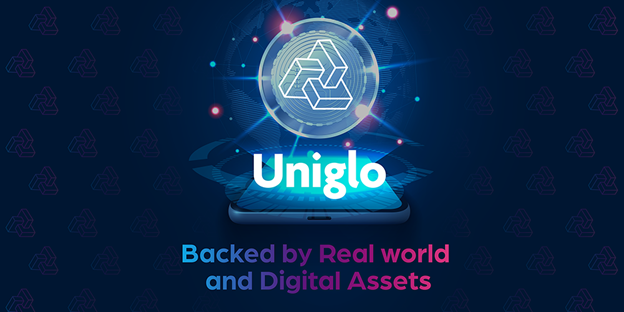DeFi remains the most exciting and fastest-growing economic sphere. However, it faces its greatest challenge to date. DeFi must evolve beyond its current state. It must become a useful tool and integrate itself within the larger financial framework instead of remaining a place where people that already own digital assets generate yield. This will remain a core function of DeFi, but to expand, it must provide value to the current legacy systems.
DeFi desperately needs protocols offering tangible utility cases. A new social currency, Uniglo (GLO), provides exactly that and will bring a new batch of utility to DeFi, much like the Ethereum (ETH) Merge and the decentralised lending protocol Aave (AAVE) once did.
Uniglo (GLO)
Uniglo provides a third option for investors. The past year has shown both fiat and digital assets to be unreliable as stores of value, with inflation destroying the value of fiat and digital assets experiencing volatility. Uniglo returns to basic economic principles and leverages tangible and digital assets to provide an alternative store of value.
Uniglo features buy and sell taxes used to acquire assets. The Uniglo Vault will house a blend of physical and digital assets hedging against the downturn of specific markets and, through diversification, creates a token that steadily appreciates. The Uniglo Vault will hold larger cap cryptos, stablecoins, smaller caps, and high-end luxury items such as fine art and gold. By creating a mix of securities, this portfolio insulates and adapts itself to any market condition. This new store of value is much-needed and brings fantastic utility to DeFi.
Ethereum (ETH)
The Ethereum Merge took place on the 15th of September. Approximately six months later, another hard fork introducing sharding will take place. The current cumbersome PoW (Proof of Work) blockchain that processes an average of 13 transactions a second will be replaced by a PoS (Proof of Stake) blockchain with a theoretical throughput of 100,000 transactions per second.
This new era of scalability will naturally expand DeFi. The Ethereum ecosystem will become more accessible to ordinary investors with lower gas fees. But, with the increased speed, it will become a more viable alternative to the current financial framework.
Aave (AAVE)
Aave popularised permissionless lending, and this DeFi protocol massively pushed DeFi’s overall utility forwards. Anyone in the world can collateralise assets and take a loan out in a totally permissionless manner. The significance of this is incredible, and as a result, Aave expanded rapidly. Currently, the protocol boasts more than $6 billion in liquidity and has become a central player with DeFi.
AAVE is the governance token; naturally, its price action is tied to the performance of its protocol. When the market reversal arrives, and investors become more risk-on, many traders will begin to seek increased exposure on Aave and buy the token to reduce platform fees. This buying pressure will naturally lead AAVE to climb in value.
Disclaimer: This is a paid release. The statements, views and opinions expressed in this column are solely those of the content provider and do not necessarily represent those of Bitcoinist. Bitcoinist does not guarantee the accuracy or timeliness of information available in such content. Do your research and invest at your own risk.
 Brian
Brian





